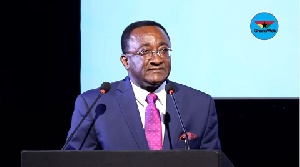 Agriculture Minister, Dr. Owusu Afriyie Akoto
Agriculture Minister, Dr. Owusu Afriyie Akoto
The Planting for Exports and Rural Development (PERD) initiative could suffer crippling defects if Ghana’s farming does not see an increase in its merchandised farm holding.
About 70 percent of farming activities in the country is peasant holding but to truly revolutionise the farming space, mechanised farming is the way to go. However challenges abound with Maxwell Acadam who is in the farming space submitting it is still an uphill task to access funding from banks and other finance houses to buy tractors, trucks, combine harvesters, countless types of farm implements including threshing machine as well as raking and binding machines which are needed to cut down on manual labour dependence while boosting production.
While about 50 percent of Ghanaian farmers produce below capacity, government is keen to change the narrative.
Following a US$180million credit agreement with India’s Exim Bank to provide machinery for Ghana’s agricultural sector and increase access to potable water in Yendi in the Northern Region, with US $150million to be injected into the Agricultural Mechanisation Services Centres (AMSECs) project, Agriculture Minister, Dr. Owusu Afriyie Akoto says unlike previous arrangements where machinery were procured and left to rot due to spare parts unavailability or limited operational knowledge to put them to maximum use, the Kwame Nkrumah University of Science and Technology (KNUST) has been partnered to help orient selected farmers on how to operate the farm machines as well as maintain the equipments.
With the credit facility coming with an interest rate of 1.50 percent and a 20 year- repayment plan in addition to a five-year moratorium, there’s need to have this facility aid the Planting for Exports and Rural Development (PERD) initiative meant to boost rural economy and reduce the reliance on cocoa.
The initiative complements the existing Planting for Food and Jobs programme which was kickstarted by the government in 2017 to increase local production of imported produce and create jobs in the process.
According to Dr. Afriyie Akoto, government has identified six tree crops that Ghana can take advantage of to be leading producers of within the next decade with the right measures.
They include Cotton, Coffee, Oil palm, Rubber, Mango, Coconut and Cashew which is supervised by local authorities especially District Chief Executives with plans afoot for the establishment of a common marketing board to oversee the growth of the selected 6 tree crops.